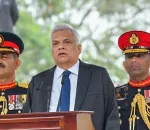By Jehan Perera –

Jehan Perera
Water skiers ride the waves. The bigger the wave the higher they go. Those who try to duck away go under the wave. It seemed that President Ranil Wickremesinghe would ride that wave that calls for local government elections which is being generated by the opposition political parties. The elections are legally due by March this year. These elections are likely to show the low esteem that the electorate has for the ruling party. This could strengthen the hand of the president in his dealings with them and compel them to support those measures needed to rebuild the country. In fact the president made an early assertion that he would not campaign even for his political party at the elections and would stay away from it, as his mandate was to revive the national economy.
The president’s interest in focusing on economic recovery would be due to the urgency of the task. The economy continues to be in steep decline, shrinking by more than 8 percent last year and with little prospects of returning to positive growth in the present year. So far there have only been incremental increases in the inflow of foreign currency into the economy due to the improved performance by the export economy and remittances by migrant workers abroad. However, the large inflow of foreign currency that would accompany investment in infrastructure and productive capacity in the longer term is yet to materialize. It is being reported that some of the most powerful hedge funds and other investors are holding up the IMF process by their hardline stance in debt-relief negotiations.
The president’s decision to stay away from the election campaign in the event of local government elections being held could also reflect his assessment of his political party’s slim chances to perform successfully in it. At the last general election, the UNP failed to win a single seat at the level of electorates. It is unlikely the party would fare much better at the local government elections. The president’s leadership is credited by better-off sections of the population for the restoration of stability after the chaos of the protest period. But the economic hardships being experienced by the masses of people make it unlikely that this restoration of stability can be converted into votes for the UNP. It may be concerns about an electoral whitewash that is now pressuring the president to put a halt to the elections.
No Progress
The prevailing situation in the country would not commend the government to the majority of people. The New Year has still to bring with it the positive movement that was promised at the end of the old year. President Wickremesinghe’s promise of a political solution to the ethnic conflict by the time the country celebrates its 75th Independence Anniversary has not shown signs of becoming real. The main Tamil political party, the TNA, has expressed its dissatisfaction with the lack of progress in regard to even the practical problems that the Tamil people are facing in the North and East of the country. The land problem continues without respite with state lands being cultivated by Tamils and Muslims being taken over and handed to companies or to Sinhalese people.
Buddhist archaeological remains found in those parts become sites of conflict when Sinhalese people enter into areas inhabited by Tamils and Muslims. The wounds of war likewise continue to fester. The issues of long term prisoners held under the Prevention of Terrorism Act and the fate of missing persons continue unresolved. Both of these issues are emblematic to the Tamil people and the government’s failure to deal with them after promising to do so will further erode their confidence in the government. The problem that the TNA faces is that such governmental failure erodes their own credibility as they have been the party in discussion with the government and viewing the president’s promises with some expectations. The need to maintain their credibility with their own electorate may explain the TNA’s declaration that they will withdraw from the process of engagement.
The government’s efforts to postpone the local government elections is another bad omen at the beginning of the New Year. In some countries, such as Australia, general elections are held every three years. In other countries, such as the United States, general elections are held every two years for half of the seats. This practice is followed to give the people an opportunity to show those who are entrusted with taking decisions whether they agree with them or not and to vent their frustrations if they are not satisfied by voting in new representatives. The importance of elections as a pressure vent in Sri Lanka cannot be underestimated as the people are in a state of anguish and frustration at their economic plight. A postponement of the local government elections can lead to the frustrations of the people being channeled in other directions, not necessarily peaceful.
Take Challenge
The conflict within the polity regarding the elections can be seen in the president’s utterances and actions. In his previous leadership roles as a five-time prime minister he governed with a light touch. But as president he has acted with a heavy hand to suppress the protest movement which he supported when out of power. The manner in which the government is continuing to arrest those who have given leadership to the protest movement sends a message of intimidation to those who might be contemplating similar protests in the future. The letter of the law is used to punish the protestors and to incapacitate them. There is a double standard in that those who engaged in mob violence on the side of the government and who have been accused of high levels of financial corruption are permitted to engage in corrupt procurements which is unpardonable in the present circumstances.
President Wickremesinghe did not become president due to his popularity with the people or because they voted for him. He took on the presidency because was willing to accept the challenge that the government offered him when the economy collapsed. The elected president Gotabaya Rajapaksa resigned in the face of the protest movement and President Wickremesinghe became the ruling party’s best option. The challenge for the president is to see his mission as more than staying in power in partnership with the ruling party that brought the country to its knees with their corruption and mismanagement. The president’s higher mission needs to be to rise above party politics and his own personal interests, and use the powers of the presidency to resolve the country’s problems. He should not become the leader of a coalition in power to stay in power.
The president has repeatedly made rational analyses of the current political and economic situation in the country and also shown a vision of the wellbeing of the nation as a whole. He has predicted the economy will get worse before it gets better. He has pledged to bring healing to the ethnic conflict without delay. He now needs to go beyond analysis and words to actions and deeds. His statement that he would not campaign for his political party at the local government elections on the grounds that his mandate is to restore the economy was an indication of the higher thinking that the president is capable of and which members of the intelligentsia and international community see in him. In its darkest hours, the country requires a leadership that is not limited to winning the next election and staying on in power by hook or by crook till then. Instead it needs a leadership that uses the power it has today to solve the problems of yesterday, today and tomorrow.
Related posts
இணைய தொழில்நுட்ப உதவி




இணைந்திருங்கள்